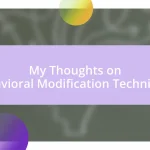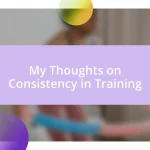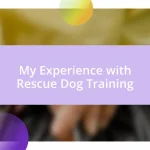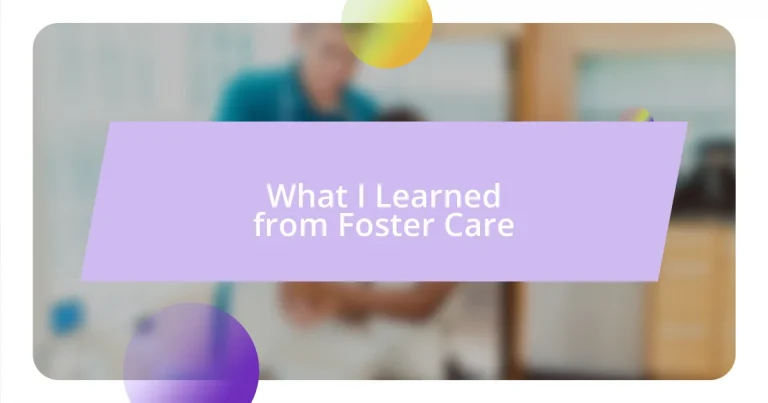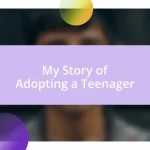Key takeaways:
- The foster care experience fosters resilience through navigating transitions, building connections, and developing emotional strength.
- Personal growth in foster care includes cultivating empathy, adaptability, and emotional resilience by confronting challenges and forming supportive relationships.
- Moving forward after foster care involves redefining one’s narrative, leveraging past experiences for strength, and engaging in community support for shared growth and belonging.
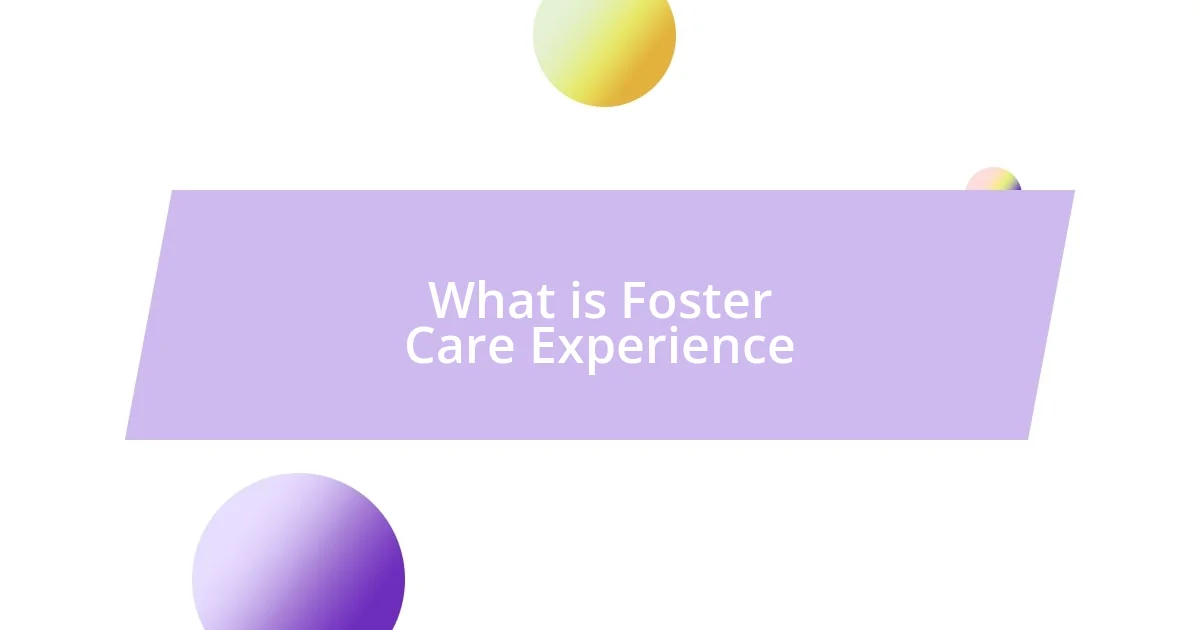
What is Foster Care Experience
Foster care experience is more than just a placement; it’s a journey filled with uncertainty and growth. I remember sitting in my first foster home, surrounded by unfamiliar faces and wondering if I would ever belong anywhere. It’s a constant emotional rollercoaster that can leave you questioning your worth.
Living in foster care often means navigating a world of transitions—new schools, new friends, and sometimes, new families. I recall the bittersweet moment of packing my bags again, feeling both frightened and excited about the unknown. How do children find stability in such a whirlwind? It’s in these moments that resilience is often born.
Every child’s experience in foster care is unique, yet many share a common struggle for connection and security. I’ve met countless kids who, like me, longed for a sense of home. This shared yearning creates a powerful bond among us, driving the question: can a temporary home ever truly feel like family? It’s a poignant reality that echoes throughout the foster care system.
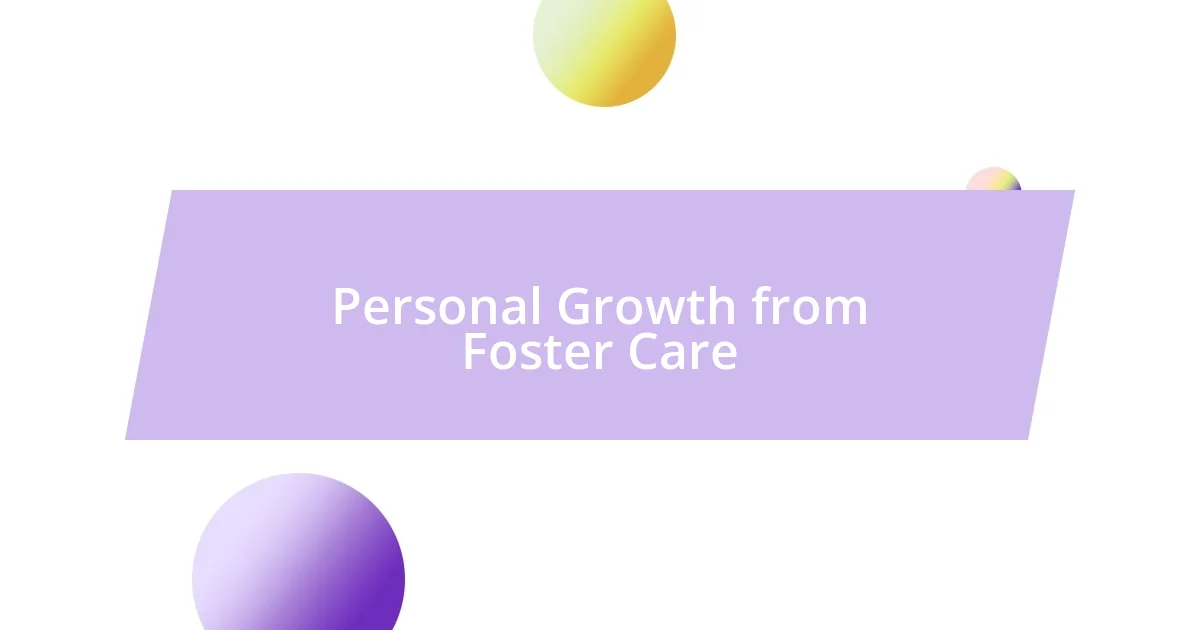
Personal Growth from Foster Care
Foster care can truly transform the way we perceive ourselves and our capabilities. I remember one particular moment after settling into a new home, feeling a surge of responsibility when asked to help care for younger foster siblings. It was a genuine revelation for me; I discovered that I could provide comfort and guidance, shaping my identity as not just a survivor but also as a caregiver. This experience taught me the importance of empathy, showing me that even in chaos, I had the power to create a safe space for others.
Adaptability became an essential skill through my foster care journey. I encountered different family dynamics, each with its unique traditions and rules. Navigating these changes felt daunting at times. Yet, I learned to adjust my expectations and embrace differences, enriching my understanding of human diversity. One family celebrated each holiday with a unique twist, and participating in those celebrations helped me appreciate the beauty of cultural variety. I often wonder—how does stepping outside our comfort zones lead us to richer experiences?
The emotional resilience I developed was perhaps the most significant growth factor. My experiences taught me to confront feelings head-on instead of burying them. I vividly recall a night spent journaling my fears and aspirations, leading me to realize my voice mattered. This practice became a cathartic outlet, and I still find solace in writing. It’s fascinating how turning to self-reflection and expressing emotions can foster strength. Have you ever explored the power of writing as a tool for processing your feelings?
| Personal Growth Aspect | Description |
|---|---|
| Empathy | Learned to provide comfort and support to others, especially younger siblings, redefining my identity. |
| Adaptability | Gained skills to navigate diverse family dynamics and cultural traditions, enriching my perspective. |
| Emotional Resilience | Developed the ability to confront and express feelings constructively, using journaling as a healing tool. |

Building Resilience through Challenges
Facing challenges in foster care is truly a crucible for building resilience. I often found myself in situations that demanded quick thinking and adaptability. One night, after a particularly rough day at a new school, I decided to push through by joining an after-school club. That decision not only led me to new friends but also showed me that confronting my fears could motivate personal growth in unexpected ways.
Building resilience involves recognizing the strength in vulnerability. I remember when I first opened up to my foster parents about my fears of abandonment. It was a scary step, yet they responded with kindness and understanding, which in turn fortified my trust in them. I learned that leaning into discomfort is necessary for growth.
-
Embrace discomfort: Share your fears and vulnerabilities with trusted individuals.
-
Seek support: Connect with peers who have similar experiences for mutual encouragement.
-
Take small risks: Engage in new activities, knowing that each step strengthens your resilience.
Facing these challenges head-on not only deepens my understanding of myself but also reinforces the belief that resilience is not just about enduring; it’s about growing through the experience.
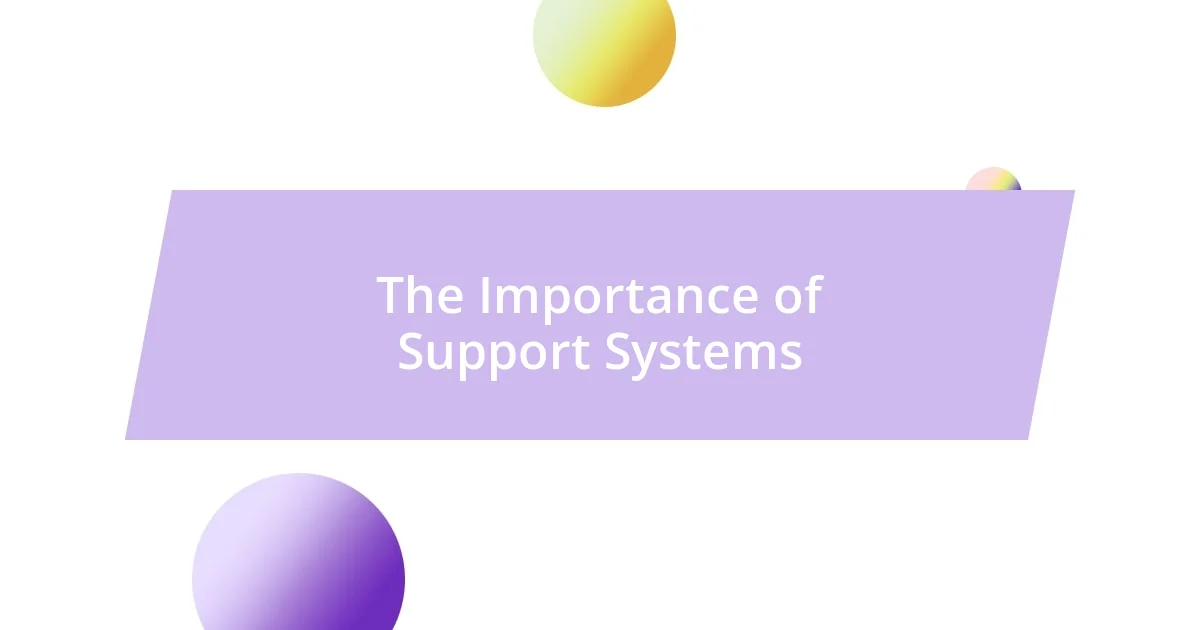
The Importance of Support Systems
Support systems are invaluable, especially in the context of foster care. I remember the unwavering support of my group of friends, who had been through similar experiences. We often gathered to share our stories, and during those moments, I felt a profound sense of belonging. It made me realize that having people who truly understand your struggles can empower you to rise above challenges.
I learned that support can come from the most unexpected places. For instance, my school counselor played a crucial role during tough times. Her ability to listen without judgment helped me navigate my feelings about changing homes. Has there ever been someone who stepped in at just the right moment for you? That experience taught me that seeking help is not a sign of weakness but a courageous step towards healing.
The value of community became crystal clear during a summer camp for foster kids. We participated in team-building activities that fostered trust and cooperation. I watched as friendships formed, and barriers broke down—all because we shared a common bond. It’s astounding how collaboration and connection can be lifelines in moments of uncertainty. How powerful is the knowledge that you’re not alone on your journey?
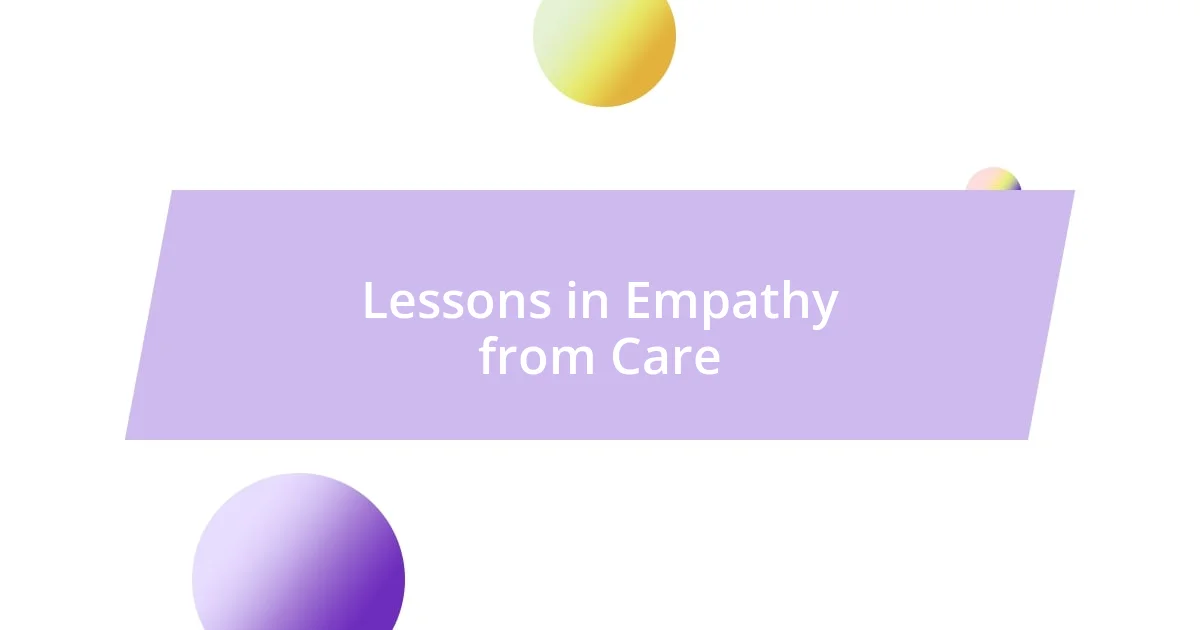
Lessons in Empathy from Care
Empathy blossomed in my heart during those challenging moments of transition when I realized how deeply connected we all are, despite our differences. One evening, as I sat with my foster siblings, we exchanged stories about our pasts. I could feel the weight of their experiences, and in those shared moments, I learned that listening is just as important as speaking. Have you ever felt the power of simply being heard? That recognition of each other’s pain and joy forged a bond that made us stronger together.
Another lesson in empathy emerged on a day when a new child joined our home. I remember feeling a mix of excitement and anxiety, unsure of how to welcome them. As I observed my foster parents embrace the new arrival with open arms, I understood that empathy was about creating a safe space for others. It’s a gentle reminder that everyone carries their own invisible burdens, and a little kindness can make a world of difference. Reflecting on moments like this, I often wonder—how can small acts of kindness ripple through someone’s life?
Through witnessing firsthand the impact of empathy, I discovered that it’s a language everyone understands, regardless of background. While volunteering at a local youth center, I interacted with kids who shared stories of heartbreak and hope. Every time I leaned in to listen, I felt my own heart expand—realizing that by simply being present, I could help ease their struggles. Who knew that the act of being there could be such a powerful antidote to loneliness? Each interaction solidified my belief that empathy doesn’t just nurture relationships; it can heal souls.
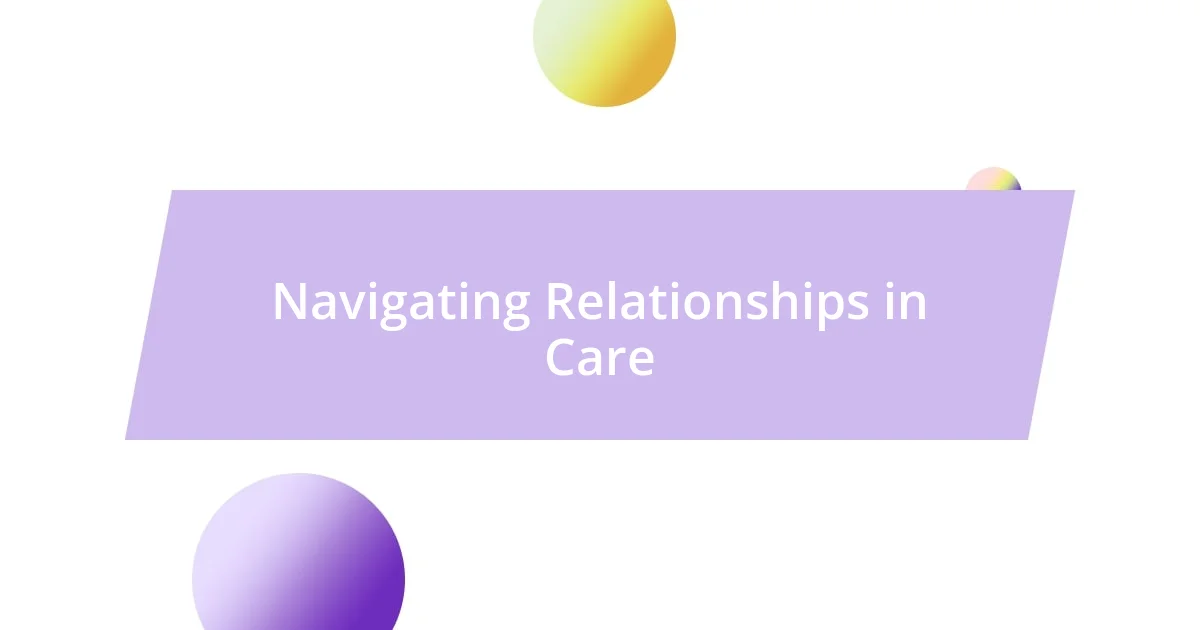
Navigating Relationships in Care
Navigating relationships in foster care can be both daunting and rewarding. I remember the first time I entered a new home, feeling a whirlwind of emotions. Was I welcome? Would I fit in? It was a relief to find that my foster siblings were just as unsure. In those moments of shared vulnerability, we began to form a bond that bridged our fears—a dynamic that taught me early on that openness fosters connection.
Choosing to trust others can be challenging, especially when moving between homes. I often found myself second-guessing whether I should let my guard down. However, I discovered that vulnerability is a two-way street. One day, while confiding in my foster mom about my worries regarding school, she shared her own experiences of feeling out of place as a child. It hit me that vulnerability creates a safe space for others to open up too, leading to stronger, more meaningful connections. Have you ever had someone’s honesty inspire you to be brave in sharing your own story?
Navigating relationships in care goes beyond just the immediate family; it extends to teachers, mentors, and friends. I recall a teacher who went the extra mile to check in on me. Her small gestures, like asking about my weekend or a simple smile in the hallway, made me feel seen. Those connections, though seemingly minor, provided a sense of stability that enabled me to flourish amidst upheaval. How many times do we overlook the power of a kind word or a small act of generosity? I’ve learned that building relationships, even when it feels scary, can lead to unexpected joy and support in the challenging journey of foster care.
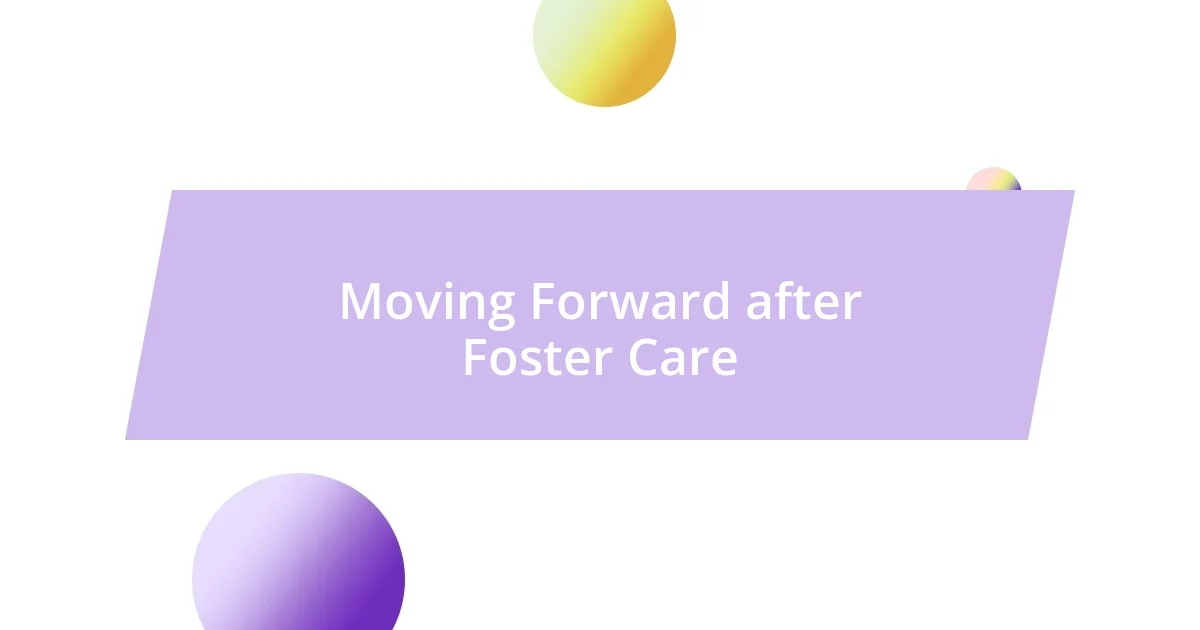
Moving Forward after Foster Care
Moving forward after foster care requires a profound shift in perspective. I recall the moment I graduated from high school, feeling both a sense of pride and trepidation. I was stepping into a world that was unfamiliar but thrumming with potential. It struck me that this was a chance to redefine my narrative, to decide who I wanted to be beyond the label of “foster care.” Have you ever faced a milestone that felt like a double-edged sword, both exciting and terrifying at once?
I vividly remember my first job interview after leaving foster care. As I sat across from the interviewer, I couldn’t shake off the shadow of self-doubt. I thought about the challenges I had overcome, and in that moment, I drew strength from my experiences. Each hardship had shaped my resilience and equipped me with unique skills. Isn’t it remarkable how our past can empower us in our future? It reminded me that while my journey might have started in uncertainty, it was up to me to craft a fulfilling path forward.
Engaging in community support groups was another vital step in my journey. I found solace in sharing my story and listening to others, realizing we were all navigating similar waters. These gatherings became a safe haven, offering a sense of belonging that I deeply craved. Reflecting on those experiences, I often wonder, how can we create spaces where voices are valued and unheard stories come to light? I genuinely believe that moving forward is not a solitary endeavor; it’s about forging connections and uplifting one another as we step into new chapters of our lives.






